情态动词语法讲解
英语语法: 情 态 动 词
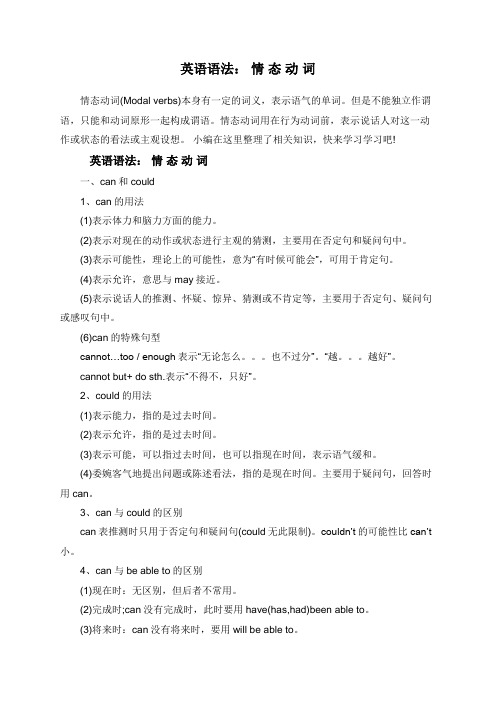
英语语法:情态动词情态动词(Modal verbs)本身有一定的词义,表示语气的单词。
但是不能独立作谓语,只能和动词原形一起构成谓语。
情态动词用在行为动词前,表示说话人对这一动作或状态的看法或主观设想。
小编在这里整理了相关知识,快来学习学习吧!英语语法:情态动词一、can和could1、can的用法(1)表示体力和脑力方面的能力。
(2)表示对现在的动作或状态进行主观的猜测,主要用在否定句和疑问句中。
(3)表示可能性,理论上的可能性,意为“有时候可能会”,可用于肯定句。
(4)表示允许,意思与may接近。
(5)表示说话人的推测、怀疑、惊异、猜测或不肯定等,主要用于否定句、疑问句或感叹句中。
(6)can的特殊句型cannot…too / enough表示“无论怎么。
也不过分”。
“越。
越好”。
cannot but+ do sth.表示“不得不,只好”。
2、could的用法(1)表示能力,指的是过去时间。
(2)表示允许,指的是过去时间。
(3)表示可能,可以指过去时间,也可以指现在时间,表示语气缓和。
(4)委婉客气地提出问题或陈述看法,指的是现在时间。
主要用于疑问句,回答时用can。
3、can与could的区别can表推测时只用于否定句和疑问句(could无此限制)。
couldn’t的可能性比can’t 小。
4、can与be able to的区别(1)现在时:无区别,但后者不常用。
(2)完成时;can没有完成时,此时要用have(has,had)been able to。
(3)将来时:can没有将来时,要用will be able to。
(4)过去时:could表示一般能力,was/were able to 表示在具体场合通过努力成功做成某事的能力。
二、may 和might1、may的用法(1)表示询问或说明一件事可不可以做。
(2)表示一件事或许会发生或某种情况可能会存在,通常用在肯定句和否定句中。
注意:表示可能性时,can’t语气强,表示“不可能”,may not语气弱,表示“可能不”。
情态动词(英语语法)
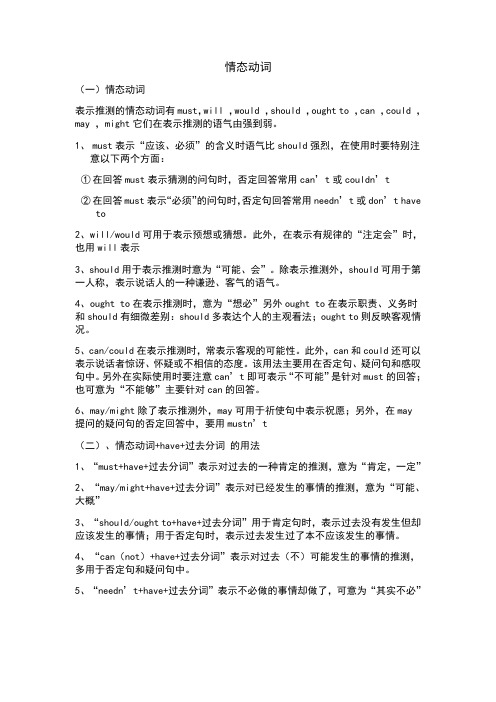
情态动词(一)情态动词表示推测的情态动词有must,will ,would ,should ,ought to ,can ,could ,may ,might它们在表示推测的语气由强到弱。
1、must表示“应该、必须”的含义时语气比should强烈,在使用时要特别注意以下两个方面:①在回答must表示猜测的问句时,否定回答常用can’t或couldn’t②在回答must表示“必须”的问句时,否定句回答常用needn’t或don’t haveto2、will/would可用于表示预想或猜想。
此外,在表示有规律的“注定会”时,也用will表示3、should用于表示推测时意为“可能、会”。
除表示推测外,should可用于第一人称,表示说话人的一种谦逊、客气的语气。
4、ought to在表示推测时,意为“想必”另外ought to在表示职责、义务时和should有细微差别:should多表达个人的主观看法;ought to则反映客观情况。
5、can/could在表示推测时,常表示客观的可能性。
此外,can和could还可以表示说话者惊讶、怀疑或不相信的态度。
该用法主要用在否定句、疑问句和感叹句中。
另外在实际使用时要注意can’t即可表示“不可能”是针对must的回答;也可意为“不能够”主要针对can的回答。
6、may/might除了表示推测外,may可用于祈使句中表示祝愿;另外,在may提问的疑问句的否定回答中,要用mustn’t(二)、情态动词+have+过去分词的用法1、“must+have+过去分词”表示对过去的一种肯定的推测,意为“肯定,一定”2、“may/might+have+过去分词”表示对已经发生的事情的推测,意为“可能、大概”3、“should/ought to+have+过去分词”用于肯定句时,表示过去没有发生但却应该发生的事情;用于否定句时,表示过去发生过了本不应该发生的事情。
4、“can(not)+have+过去分词”表示对过去(不)可能发生的事情的推测,多用于否定句和疑问句中。
英语语法之情态动词
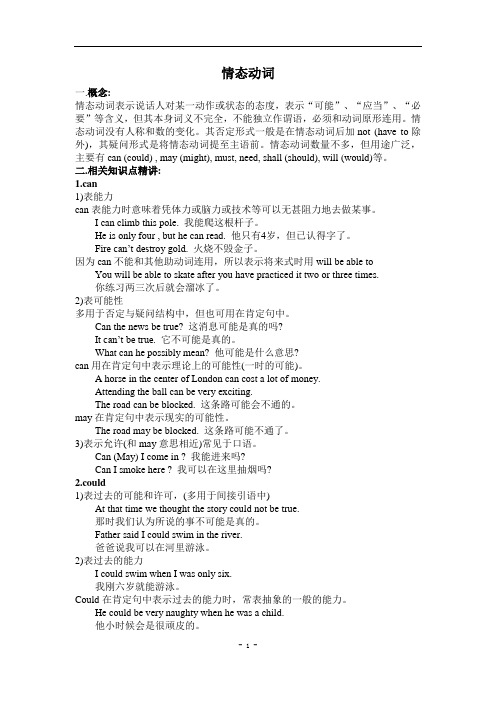
情态动词一.概念:情态动词表示说话人对某一动作或状态的态度,表示“可能”、“应当”、“必要”等含义,但其本身词义不完全,不能独立作谓语,必须和动词原形连用。
情态动词没有人称和数的变化。
其否定形式一般是在情态动词后加not (have to除外),其疑问形式是将情态动词提至主语前。
情态动词数量不多,但用途广泛,主要有can (could) , may (might), must, need, shall (should), will (would)等。
二.相关知识点精讲:1.can1)表能力can表能力时意味着凭体力或脑力或技术等可以无甚阻力地去做某事。
I can climb this pole. 我能爬这根杆子。
He is only four , but he can read. 他只有4岁,但已认得字了。
Fire can’t destroy gold. 火烧不毁金子。
因为can不能和其他助动词连用,所以表示将来式时用will be able to You will be able to skate after you have practiced it two or three times.你练习两三次后就会溜冰了。
2)表可能性多用于否定与疑问结构中,但也可用在肯定句中。
Can the news be true? 这消息可能是真的吗?It can’t be true. 它不可能是真的。
What can he possibly mean? 他可能是什么意思?can用在肯定句中表示理论上的可能性(一时的可能)。
A horse in the center of London can cost a lot of money.Attending the ball can be very exciting.The road can be blocked. 这条路可能会不通的。
may在肯定句中表示现实的可能性。
基础语法---情态动词
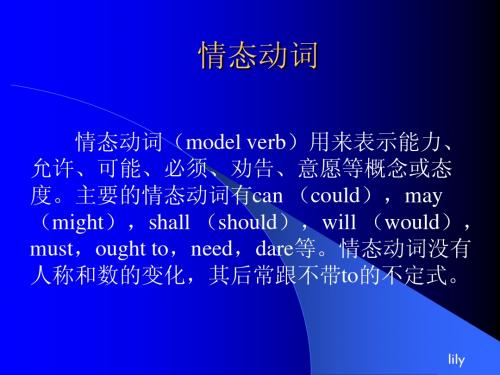
情态动词情态动词(model verb)用来表示能力、允许、可能、必须、劝告、意愿等概念或态度。
主要的情态动词有can (could),may (might),shall (should),will (would),must,ought to,need,dare等。
情态动词没有人称和数的变化,其后常跟不带to的不定式。
1. 情态动词的一般用法:●(1)表示能力:can,could,be able to●He is over80but stillcan read withoutPREPOSITION glasses.●She couldn't comeyesterday.●He can’t cometomorrow.(2)表示许可:can/could, may/might; can’t, maynot, mustn’t, must not●1)征询“许可”或给予“许可”可用can/could或may/might表示。
May用于正式场合,can用于非正式场合,could用于客气的询问,might极少用。
●You can go at four o’clock.●Could I borrow your pen?●Students may take3books each.●Might I ask whether you are using the typewriter?●2)表示“不允许”用can’t,may not,mustn’t;must not语气重。
●You can’t leave the table unless you finish your meal.●Put that cigarette out.You must not smoke near a petrol pump!●3)表示过去“许可”不用could,might,要用其他表达方式。
●We had been/were given permission to speak to the patient.●但在间接引语中表达过去“许可”,可用could,might。
情态动词的用法
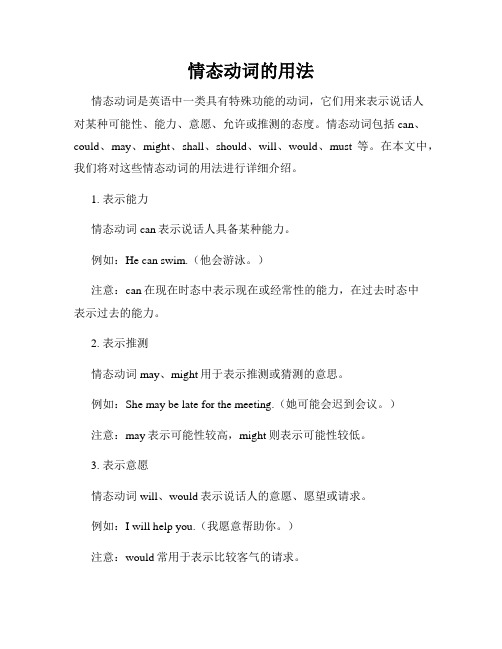
情态动词的用法情态动词是英语中一类具有特殊功能的动词,它们用来表示说话人对某种可能性、能力、意愿、允许或推测的态度。
情态动词包括can、could、may、might、shall、should、will、would、must等。
在本文中,我们将对这些情态动词的用法进行详细介绍。
1. 表示能力情态动词can表示说话人具备某种能力。
例如:He can swim.(他会游泳。
)注意:can在现在时态中表示现在或经常性的能力,在过去时态中表示过去的能力。
2. 表示推测情态动词may、might用于表示推测或猜测的意思。
例如:She may be late for the meeting.(她可能会迟到会议。
)注意:may表示可能性较高,might则表示可能性较低。
3. 表示意愿情态动词will、would表示说话人的意愿、愿望或请求。
例如:I will help you.(我愿意帮助你。
)注意:would常用于表示比较客气的请求。
4. 表示推测的过去情态动词must常用于表示对过去情况的推测或肯定。
例如:He must have missed the bus.(他肯定错过了公交车。
)注意:must用于表示对过去情况的肯定,而might用于表示对过去情况的推测。
5. 表示义务或必要性情态动词must表示对义务、必要性或确定性的肯定。
例如:You must finish your homework.(你必须完成作业。
)6. 表示建议或应该情态动词should表示建议或应该。
例如:You should go to bed early.(你应该早点睡觉。
)注意:should还可以表示对过去情况的推测,例如:He should have arrived by now.(他现在应该已经到达了。
)7. 表示允许或许可情态动词can与may可以用于表示许可或允许。
例如:Can I borrow your pen?(我可以借你的钢笔吗?)8. 表示可能性情态动词could用于表示可能性。
情态动词语法
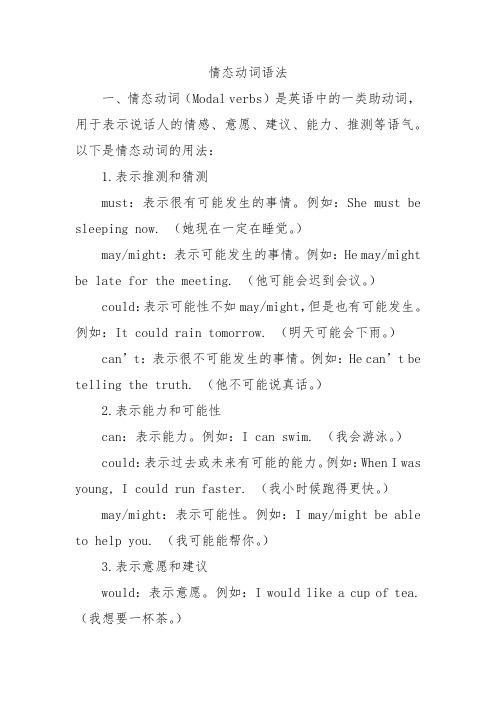
情态动词语法一、情态动词(Modal verbs)是英语中的一类助动词,用于表示说话人的情感、意愿、建议、能力、推测等语气。
以下是情态动词的用法:1.表示推测和猜测must:表示很有可能发生的事情。
例如:She must be sleeping now. (她现在一定在睡觉。
)may/might:表示可能发生的事情。
例如:He may/might be late for the meeting. (他可能会迟到会议。
)could:表示可能性不如may/might,但是也有可能发生。
例如:It could rain tomorrow. (明天可能会下雨。
)can’t:表示很不可能发生的事情。
例如:He can’t be telling the truth. (他不可能说真话。
)2.表示能力和可能性can:表示能力。
例如:I can swim. (我会游泳。
)could:表示过去或未来有可能的能力。
例如:When I was young, I could run faster. (我小时候跑得更快。
)may/might:表示可能性。
例如:I may/might be able to help you. (我可能能帮你。
)3.表示意愿和建议would:表示意愿。
例如:I would like a cup of tea. (我想要一杯茶。
)should:表示应该做的事情。
例如:You should go to see a doctor if you feel sick. (如果你感到不舒服,你应该去看医生。
)4.表示命令和建议must:表示强制性的命令或规定。
例如:You must wear a helmet when riding a bike. (骑自行车时必须戴头盔。
)should:表示建议或推荐。
例如:You should study hard for the exam. (你应该努力学习考试。
语法解析情态动词的用法与含义
语法解析情态动词的用法与含义情态动词是英语中一类重要的词汇,用来表达说话者的态度、意愿、推测等。
本文将对情态动词的用法与含义进行语法解析。
一、情态动词的定义情态动词(modal verbs)是一类具有特殊语法性质的助动词,用来表示说话者对某种动作、状态或情况的态度、意愿、推测、能力等。
情态动词没有词义上的主动意义,通常与其他动词连用,构成完成时态、否定形式和疑问句等。
二、情态动词的用法与含义1. Can情态动词"can"表示能力、允许和可能性。
例如:- I can swim.(我会游泳。
)- Can I borrow your book?(我可以借你的书吗?)- It can rain tomorrow.(明天可能会下雨。
)2. Could情态动词"could"表示过去的能力、可能性或礼貌的请求。
例如:- When I was younger, I could run faster.(我年轻时跑得更快。
)- Could you please pass me the salt?(请你递给我盐吗?)- I thought he could be the one.(我以为他可能是那个人。
)3. May情态动词"may"表示允许、可能性和提出请求。
例如:- You may go now.(你可以现在走了。
)- It may rain later.(后面可能会下雨。
)- May I have a glass of water, please?(请给我一杯水,好吗?)4. Might情态动词"might"表示可能性、推测或婉转的请求。
例如:- He might come to the party.(他可能会来参加派对。
)- It might be a good idea.(这可能是个好主意。
)- Might I ask you a question?(可以问你个问题吗?)5. Must情态动词"must"表示必须、推测和说话者的坚定态度。
小学英语语法讲解-动词 情态动词
情态动词一、情态动词的定义:情态动词有词义,但它不能单独作谓语,它必须和其他动词一起构成谓语。
情态动词没有人称和数的变化;它的后面必须跟动词原形。
1、Can I help you? ——Yes, please. / No, thanks.2、Can + 主语+ 动词原形? Yes, ~can. No, ~can’t.3、Can I borrow your book?----Yes,of course.4、Can I write on the book? ------No, you can’t\mustn’t.5、Could \Can you help me?---- Yes,of course.\Certainly.\ Sure.6、Could \Can you tell me the way to the Zoo?7、May I come in ?----- Come in, please.8、May I sit here?----- Yes, please.\Sorry, please don’t.9、May I have some Coke?---- Yes, of course.10、May/ Could / Can I speak to Tom? -----Speaking. Who’s calling?11、should 、shouldn’t 表示劝告:1) He should get up early.2) She shouldn’t play computer game too much.12、Should +主语+动词原形? Yes, ~should.\ No, ~shouldn’t.13、表示建议“你愿意…吗”Would you like to go shopping with me?-----Yes, I’d love to. /I’d love to. But I’m busy now.14、就餐用语Would you like something to eat\drink? ----Yes, I’d like…15、shall用于第一人称(I, we), 可以表示“将”和表示建议“……好吗?”1) Where shall we have dinner?2) Shall we go fishing? -----All right. \OK. \Good idea.16、Must + 主语+ 动词原形? ---Yes,~must.\No, ~needn’t.四、相关练习:(一) 用适当的情态动词填空。
情态动词英语语法知识精讲
情态动词英语语法知识精讲情态动词概述特征1情态动词modal verb本身有词义,表示说话人的语气或情态,但词义不完全,不能单独用作谓语动词,一般只能和动词原形一起构成谓语动词。
2情态动词所表示的情态有:命令、允诺、请求、拒绝、愿望、愿意、义务、必要、可能、能力、敢于、需要等。
3情态动词ought除外和助动词shall,will,should,would一样,后面的动词不定式一般皆不带。
形式变化1没有人称和数的变化,第三人称单数的现在时也无变化。
如:I can We canYou can You canHeThey canShe canIt2有些情态动词有过去式,有少数过去式和它的原形相同。
a有过去式的情态动词有:may -- wouldcan ―― couldmay―― nightshall -- shouldhave to -- had tob过去式不变的情态动词有:must - must 或had toought to - ought toneed---needdare - dare亦可用dared3大多数情态动词后面可用动词的进行式、完成式和被动形式,如:canmay,mustbe doing,canmay,must have done,canmay,mustbe done等。
否定式情态动词和助动词一样,后面可直接跟否定词not。
现将情态动词的否定式及其否定式的简略式简略式用于口语中列举如下:shall not--shan't [FB:nt]will not---won't [wEunt]can not-can't [kB:nt]must not-mustn't [5mQsnt]should not-- shouldn'twould not-- wouldn'tcould not-- couldn'tdare not- daren't [dZEnt]need not-- needn't在疑问句中的用法情态动词在疑问句中的用法和助动词相同。
初二下情态动词用法
初二下情态动词用法
一、基本认识:情态动词包括can、could、may、might、shall、should、will、would、must等。
这些动词用来表示可能性、能力、许可、义务等概念。
二、肯定句用法:情态动词通常与动词原形连用,构成肯定句。
例句:He can speak English fluently.
三、否定句用法:在否定句中,通常在情态动词后加not。
例句:She cannot (can't) come to the party.
四、疑问句用法:在疑问句中,将情态动词移至句首。
例句:Can you help me with my homework?
五、情态动词的意义和用法:
Can/Could:表示能力或许可。
Can用于现在,could用于过去。
May/Might:表示许可或可能性。
May更正式,might更委婉。
Shall/Should:表示义务或建议。
Should用于提供建议。
Will/Would:表示将来意愿或过去习惯。
Will用于现在或将来,would用于过去。
Must:表示必须或确定性。
六、情态动词的特殊搭配:
例句:You should study hard for the exam.
例句:I must finish my homework before going out.。
- 1、下载文档前请自行甄别文档内容的完整性,平台不提供额外的编辑、内容补充、找答案等附加服务。
- 2、"仅部分预览"的文档,不可在线预览部分如存在完整性等问题,可反馈申请退款(可完整预览的文档不适用该条件!)。
- 3、如文档侵犯您的权益,请联系客服反馈,我们会尽快为您处理(人工客服工作时间:9:00-18:30)。
Modal Verbs情态动词有can (could), may (might), must (must), have to, shall (should), will (would), need (need), dare (dared), ought to 等。
情态动词无人称和数的变化。
它不能单独使用,必须跟其后的动词原形构成谓语。
情态动词的具体用法如下:一、can, could1、表示能力。
a. Can you speak English?b. Can you finish this work tonight?c. Man cannot live without air. Note:(1) can表示能力时,可用be able to 代替。
a. I’ll not be able to come this afternoon.(2) 当我们要表示“某件事情已经成功”时,应用was/ were able to , 不能用coulda. He saw well and he was able to swim to the river when the flood happened.b. He was able to go to the party yesterday evening and he enjoyed himself very much.2、表示客观可能性a. People who live near airports can have their hearing harmed.b. The boy can sometimes be very naughty. (表示某人或某物一时的情况,“有时会。
”)c. The invention can be improved.d. Even experts can make mistakes.e. He can’t be in Beijing now because I saw him a moment ago.f. He had a lot of work to do last night, so he couldn’t have gone to see a film.Note:在肯定句中用can表示可能性时,其含义是理论上的可能性,不表示实际的可能性,也就是说,不涉及到是否真会发生。
3、表示惊异、怀疑、不相信的态度(主要用与否定句、疑问句或感叹句中)a. Can this be true?b. How can you be so careless!c. This cannot be done by him.4、表示请求和允许。
a. --- Can I go now?--- Yes, you can.b. You can smoke if you want to.c. You can’t pick flowers in this park. Note:could也可以表示请求,语气较委婉,主要用于疑问句,不用于肯定句,回答应用can--- Could I come to see you tomorrow?--- Yes, you can. / No, I’m afraid not.5、can 的一些其他惯用法(1). cannot but, cannot help but, cannot choose but +动词原形,意思为“不得不,只得”。
a. I cannot help but tell her the truth.2. cannot help doing stha. I cannot help laughing.3. cannot …too / enough, can never tooa. You cannot be too careful when you cross the street.b. I cannot thank you too much for your kindness; I owe my progress to you.二、may, might1、表示许可。
a. You may go now.b. We may keep the books for two weeks.c. --- May I smoke here?--- Yes, you may. / No, you may not. / No, you mustn’t.2、表示可能性a. He may be waiting for you at the station.b. They may have got lost.Note:表示可能性时,may 不用于疑问句。
在疑问句中表示“可能”时,通常用“be likely to ”或“Do you think”这一结构。
3、用于让步状语从句中a. However hard you may study, you cannot master English in a month.b. Don’t give up whatever difficulties you may meet with.4、用于祈使句,表示祝愿。
a. May you succeed!b. May we never forget each other!5、might常用于表示委婉的请求或轻微的责备。
a. You might post this letter for me if you are going near a post box.b. You might have let me know before!6、用于某些习惯用法中(1) may /might as well = had bettera. It’s getting darker and darker. You may/might as well go home.(2) may well + 动词原形,意思为“理所当然,有足够的理由”。
a. He has grown up tall. You may well not recognize him.三、must, have to1、表示义务和强烈的劝告。
意思为“必须”、“一定要”。
a. You must finish your task ahead of time.b. You must talk to your daughter about her future.2、表示有把握的推测,意思为“一定是”,“准是”。
a. I failed in the exam. You mustthink I am stupid.He must be a college student, isn’t he?b. You look happy. You must be having a good time.c. He looks tired. He must have stayed up l ate last night, didn’t he? d. You speak English so fluently. You must have learned it for many years, haven’t you?3、表示肯定性或难以避免,意思为“必然会、”“肯定会”。
a. All men must die.b. Don’t bet o horse races; you must lose in the long run.4、作“偏要”、“硬要”解。
(1)常以第二人称为主语,意思指不耐烦过令人不愉快的事情。
a. If you must smoke, at least you should do it outside.b. If you must know, I’m going to help him look for an apartment.c. Why must you buy that car? (2)用于其它人称,表示主语“固执”或“不巧”的意思。
a. The car must break down just as we were starting our holiday.b. Jane was never a pleasant young girl. After you gave her your advice, she must go and do the opposite.5、must的否定有如下三种形式,用于三种不同的场合。
(1) 当must表示“推测”时,其否定含义为“不可能”。
将mustbe 改为cannot be;将musthave done 改为cannot havedone。
a. It must be eleven o’clock now.It cannot be eleven o’clock.b. You must have met him before. You cannot have met him before.(2)当must 表示“必须”时,其否定含义为“不必”。
将must do改为need not do 或don’thave to do 。
a. You must get up at six tomorrow morning.You need not get up at sixtomorrow morning. / You don’thave to get up at six tomorrowmorning.(3)回答以must提问的句子,可以如下形式进行肯定或否定形式作答。
Yes, you must.a. Must we clean all the rooms? No, you don’t have to.No, you needn’t.6、must 和have to的区别四、ought to1、表示“应该”(与should同义,只是语气稍重一些, ought to 强调责任、义务),无人称和时态变化。
a. You are his father. You ought to take care of him.b. You ought not to smoke here.c. Ought you to smoke so much?五、shall, should1、在疑问句中,用于第一、第三人称,表示征求对方的意见。
a. Shall we do this evening?b. Shall I do it for you?c. Shall he come in or wait outside? = Do you want him to …?2、用于第二、第三人称,表示说话人给对方的命令、警告、允诺或威胁。
